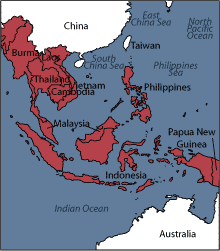This module examines women�s attempts to negotiate political spaces in the realms of official and unofficial power in Southeast Asia in the 20th century. Southeast Asia is composed of 11 countries�Philippines, Indonesia, Malaysia, Singapore, Vietnam, Burma, Laos, Cambodia, Thailand, Brunei, and East Timor. In the early 20th century, Southeast Asian countries were still colonized (or semi-colonized) states. Hence, both Southeast Asian men and women were colonial subjects without political independence.
Nationalism and Feminism, 1920s-1970s
Western colonial rulers permitted Southeast Asian men a limited participation in the politics of the colonies, and by the 1920s the question of women�s suffrage had become an issue. The colonial situation introduced a tension between feminism and nationalism as budding feminists were pressured to prioritize national independence over women�s political agendas. While men campaigned for independence from colonial rule, women�s roles in that evolving nation were still contested. Women�s desire to be part of nation building and men�s reluctance to share that space equally raised dilemmas for the early feminists. For Southeast Asian men, supporting the nationalist project meant advocating immediate independence from Western colonial powers. For Southeast Asian women, supporting the nationalist project meant lobbying for a government that would disenfranchise them as women. Nonetheless, there was a lively suffrage movement in Southeast Asia with unique features that differed from Western first-wave feminism�s emphasis on formal political participation.
In the 1940s, the Japanese occupation of Southeast Asia introduced a new colonial ruler and a wartime situation. The women�s movement was temporarily put on hold because of wartime conditions, but women were active in the resistance movements against the Japanese. With the end of World War II, and the end of the revolutions against their colonizers, the newly independent nations of Southeast Asia experienced fragile democracies as governments oscillated between dictatorship and democracy. In Indonesia and the Philippines, the dictatorships in the 1970s laid the groundwork for a different type of feminist�the militant woman activist who fought dictators and demanded human rights. The tension between feminism and nationalism surfaced as women once again were asked to prioritize national liberation (the restoration of democratic institutions) over women�s rights (perceived as a �soft� issue).
Unofficial Power Versus Official Power
Western feminist theories cannot be easily applied to these societies, because Southeast Asia has different concepts of power and different prestige systems. Southeast Asian concepts of power see power held by the kinship group, and not just the person in office. This unique trait enables women to exercise political power outside the symbols of power/office through their kinship ties�as mothers, sisters, wives, daughters, and even mistresses of male politicians.
Because kinship politics (the use of political power to benefit the kinship group) is the dominant dynamic in Southeast Asian politics, women have been able to exercise quite an enormous amount of political power�albeit behind the scenes. Although unofficial power is the traditional way women exercise power (roughly 11% of Southeast Asia politicians are women), it is often women who first exercise unofficial power who become politicians. Connected to the kinship politics of their male relatives, these women are able to win election campaigns. In fact, the pattern is so prevalent that the Far Eastern Economic Review�s humor section advised women would-be politicians with the quip: �The avenues to political success are to choose one�s father carefully, or a husband likely to be assassinated.�1
While this power behind the scenes has been the traditional way for women to exercise power in the Southeast Asian context, feminists have lobbied and campaigned for women�s rights to exercise official power and to run for political office themselves. Interestingly, scholars have focused on official power and have not dealt with unofficial power (because it is seen to be undemocratic, illegitimate, and unaccountable), and have so far ignored the potential of unofficial power.
This module focuses on analyzing the contradictions in the traditional gendering of power, where women are given enormous power, albeit unofficial, as well as on women�s more recent efforts to attain official power.
1 Frank Ching, �Asia�s Women Leaders Depend on Parents� or Husbands� Fame�, Far Eastern Economic Review, August 19, 1993, 28.



